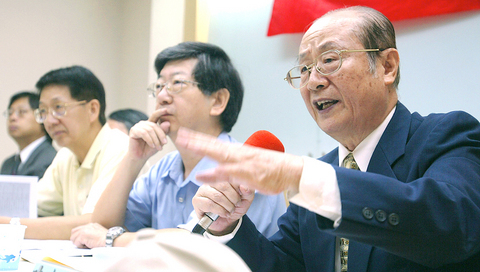The Taiwan Association of University Professors yesterday blamed the pan-blue controlled legislature for the governing party's poor performance, saying that lawmakers wielded too much power over budgets and policies.
The association, known for its pro-independence stance, made the remarks yesterday in connection with the publication of a report on the nation's politics.
Ho Tsing-jen (何清人), the association's president, said that recent polls showed that the public was unsatisfied with the performance of the Democratic Progressive Party (DPP), but that in fact this poor showing was due to the legislature being able to dominate other government agencies -- and wield more power than the president.

PHOTO: CNA
For example, legislative power far exceeds the power of the nominal Control Yuan, Ho said. That body has been effectively dormant due to the pan-blue camp's refusal to review and approve the president's nominations.
The government cannot guide policies in such an environment, he said.
Another reason for the Democratic Progressive Party's (DPP) sagging poll numbers is the media's habit of exaggerating and making groundless assumptions, Ho said at a press conference yesterday.
"People should learn to distinguish truth from lies and support a good government when they see one, regardless of their political stance," he said.
"The DPP government still has much room for improvement, but it has offered the Taiwanese people a more democratic and open environment to live in," he added.
The report also touched on recent cross-strait relations, administrative developments and local government activities.
Chen Chun-sheng (陳春生), an honorary professor in the Graduate Institute of National Development at National Taiwan University, said that former chairman of the Chinese Nationalist Party (KMT) Lien Chan's (連戰) recent trip to Beijing harmed the nation's sovereignty.
The KMT co-organized an economic forum with the Chinese Communist Party (CCP) last month in Beijing.
This event showed that the KMT is conspiring with China to press Taiwan toward unification through economic means, Chen said.
He compared the Taiwanese people to "frogs being cooked in warm water" -- who don't clearly feel a threat but nonetheless end up being slowly killed and "eaten."
Such moves by the KMT are tantamount to recognizing that Taiwan is part of China, he added.
The association warned that if the KMT wins the presidency in 2008, Taiwan will be in danger of being annexed by China because the KMT will hold negotiations with the CCP to downgrade Taiwan's status to a special administrative region.
Allowing cross-strait direct flights would also pose a threat to the nation's economy and therefore the government should ignore the pan-blue legislators' recent attempts to push for the flights, Chen added.
In terms of administrative development, one of the main problems is that human resources are not equally distributed in government agencies, said Wu Yen-tsun (

Chinese spouse and influencer Guan Guan’s (關關) residency permit has been revoked for repeatedly posting pro-China videos that threaten national security, the National Immigration Agency confirmed today. Guan Guan has said many controversial statements in her videos posted to Douyin (抖音), including “the red flag will soon be painted all over Taiwan” and “Taiwan is an inseparable part of China,” and expressing hope for expedited reunification. The agency last year received multiple reports alleging that Guan Guan had advocated for armed reunification. After verifying the reports, the agency last month issued a notice requiring her to appear and explain her actions. Guan

GIVE AND TAKE: Blood demand continues to rise each year, while fewer young donors are available due to the nation’s falling birthrate, a doctor said Blood donors can redeem points earned from donations to obtain limited edition Formosan black bear travel mugs, the Kaohsiung Blood Center said yesterday, as it announced a goal of stocking 20,000 units of blood prior to the Lunar New Year. The last month of the lunar year is National Blood Donation Month, when local centers seek to stockpile blood for use during the Lunar New Year holiday. The blood demand in southern Taiwan — including Tainan and Kaohsiung, as well as Chiayi, Pingtung, Penghu and Taitung counties — is about 2,000 units per day, the center said. The donation campaign aims to boost

The Kaohsiung Tourism Bureau audited six hotels in an effort to prevent price gouging ahead of Korean band BTS’ concert tour in the city scheduled for Nov. 19, 21 and 22 this year. The bureau on Friday said that the audits — conducted in response to allegations of unfair pricing posted on social media — found no wrongdoing. These establishments included the local branches of Chateau de Chine, Hotel Nikko, My Humble House, and Grand Hai Lai, it said, adding that the Consumer Protection Commission would have penalized price gougers had the accusations been substantiated. The bureau said the Tourism Development Act

BACK TO WINTER: A strong continental cold air mass would move south on Tuesday next week, bringing colder temperatures to northern and central Taiwan A tropical depression east of the Philippines could soon be upgraded to be the first tropical storm of this year, the Central Weather Administration (CWA) said yesterday, adding that the next cold air mass is forecast to arrive on Monday next week. CWA forecaster Cheng Jie-ren (鄭傑仁) said the first tropical depression of this year is over waters east of the Philippines, about 1,867km southeast of Oluanpi (鵝鑾鼻), and could strengthen into Tropical Storm Nokaen by early today. The system is moving slowly from northwest to north, and is expected to remain east of the Philippines with little chance of affecting Taiwan,